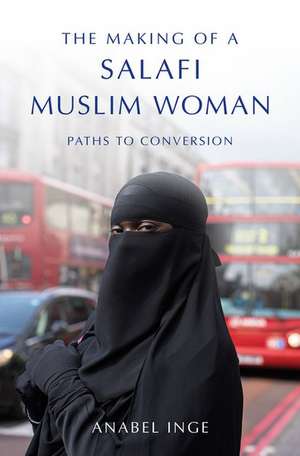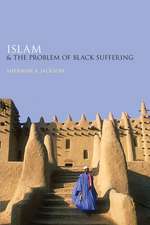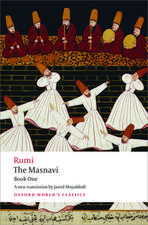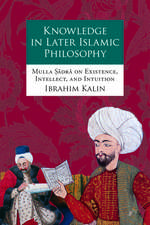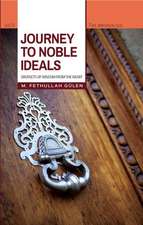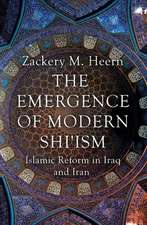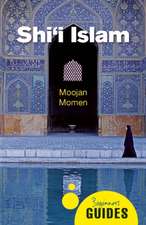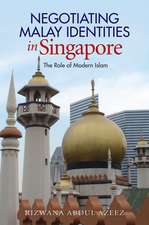The Making of a Salafi Muslim Woman: Paths to Conversion
Autor Anabel Ingeen Limba Engleză Hardback – 24 noi 2016
| Toate formatele și edițiile | Preț | Express |
|---|---|---|
| Paperback (1) | 200.89 lei 31-37 zile | |
| Oxford University Press – 10 mai 2018 | 200.89 lei 31-37 zile | |
| Hardback (1) | 311.77 lei 31-37 zile | |
| Oxford University Press – 24 noi 2016 | 311.77 lei 31-37 zile |
Preț: 311.77 lei
Preț vechi: 354.03 lei
-12% Nou
Puncte Express: 468
Preț estimativ în valută:
59.66€ • 62.41$ • 49.56£
59.66€ • 62.41$ • 49.56£
Carte tipărită la comandă
Livrare economică 22-28 martie
Preluare comenzi: 021 569.72.76
Specificații
ISBN-13: 9780190611675
ISBN-10: 0190611677
Pagini: 320
Ilustrații: 6 illus.
Dimensiuni: 160 x 236 x 28 mm
Greutate: 0.52 kg
Editura: Oxford University Press
Colecția OUP USA
Locul publicării:New York, United States
ISBN-10: 0190611677
Pagini: 320
Ilustrații: 6 illus.
Dimensiuni: 160 x 236 x 28 mm
Greutate: 0.52 kg
Editura: Oxford University Press
Colecția OUP USA
Locul publicării:New York, United States
Recenzii
This is an ethnography of the very best kind. Inge is both systematically rigorous and sensitively empathic. We learn to see these women as women, facing the challenges of life in a contemporary western society that is not infrequently hostile-especially to women who are assumed to be either aggressively extremist or browbeaten victims of Islamophobia. These women are neither. Obviously enough, this is a book that should be read by anyone concerned about new religions and/or contemporary Islam. It could also be read with benefit by feminists and by those with an interest in qualitative methodology. But for anyone, it is a damn good read.
If you want to understand British Islam, you need to read it.
This is an under-researched subject and so any credible information is very welcome.
[A] rich portrait ... Inge found that nearly all of the Salafi women she followed in her research decided to wear the face veil against the wishes - sometimes despite the threats - of family members, who saw it as too extreme, too Arab, too rebellious. Officials often argue that Muslim women are too submissive to challenge extremist views even within their own families. But women who wear a garment that annoys their families, that provokes regular verbal abuse and leads to their being pelted with food in public are something other than submissive.
A uniquely remarkable book nestled in the most cherished humanist tradition of the social sciences. Anabel Inge has written a book that is bound to inform and challenge people's stereotypes about the lives of Salafi women in London. From conversion to religious study circles and match-making, the author navigates a difficult terrain with a penetrating anthropological gaze and careful attention to subtle details. The book is a joy to read.
When is Islamic extremism not extremism? In this wonderfully lucid and scholarly ethnographic study of young Salafi women in London ... Anabel Inge probes what has become a dominant question in British twenty-first-century public policy ... closely observed, nuanced anthropological research over more than two years ... The Making of a Salafi Muslim Woman is in many ways a remarkable, innovative book which deserves a wide readership. It opens up a window on African Muslims, particularly Somalis, who both resemble and differ from the majority of British Muslims.
The first sustained empirical research into this hard-to-reach community. It therefore provides rich everyday granularity rarely seen in this area -- perhaps not since Saba Mahmood's The Politics of Piety in 2014 ... Inge reveals a dynamic and complex picture of Salafism in the UK, which challenges essentialist 'letter-box' views of the community ... [The book] also reads well, making it accessible to experts and novices alike.
Dr. Inge's new book is welcome reading... This is a brave and important study.
Extremely well-written, thoughtful, well-researched...What this book highlighted, and what I thought was so important about it, is that it focused on the lived experiences of Salafi women... which are very, very different from those of Salafi men. Whether in terms of the culture of the community, or how Islam is taught and internalized, to the challenges of finding a spouse and contending with things not working out, to struggling with both family tensions and challenges in the academic world / work force... what women go through is so, so different, and so often ignored and underappreciated... I highly recommend it.
This very accessible and timely book is the outcome of sensitively conducted ethnographic fieldwork among Salafi women in London. The research that underpins it reflects a high degree of professionalism, thoroughness, and meticulous attention to detail. I am delighted to commend this important book to anyone wanting to understand the complexity and paradoxes that shape the lives of Muslim women as they explore their personal and religious goals.
Salafi Islam is often viewed through the lenses of global religious extremism, terrorism, and security. Anabel Inge's The Making of a Salafi Muslim Woman fills a lacuna in scholarship on apolitical, non-violent Salafi Islam in Europe and its attraction among British women converts in the United Kingdom.
Anabel Inge gained unprecedented access to Salafi mosques and circles in London, where she conducted fieldwork for more than 2 years. Her book represents the first sustained, in-depth exploration of everyday Salafism... [T]his book is an outstanding addition to the literature on Islam in the United Kingdom and represents a truly unique ethnographic piece of fieldwork within a hard-to-reach community.
The Making of a Salafi Muslim Woman is a meticulously researched and well-presented book. The author manages to paint a nuanced picture of a complex community which is often portrayed in highly biased and stereotyped ways... The unprecedented access the author gained allowed her to acquire detailed and comprehensive insider knowledge of Salafism in particular and Islam in general. [She] remains respectful of the women she studies but critical and independent in her analysis, which is remarkable considering the amount of publications on Muslim women which are characterised by a patronising, othering and essentialist tone. Inge succeeds in staying clear of this pitfall of research on Muslim women.
[A] rich and sensitive description of how women navigate strict Salafi teachings in a non-Muslim society... One of the central contributions of the book is to clearly explain Salafism to non-Muslim audiences... Her comprehensive findings [are] quite unprecedented in the literature on Salafism... beautifully written scholarship. By providing a thorough inquiry into the fastest-growing Muslim faction in Britain, The Making of a Salafi Muslim Woman is a must-read for anyone interested in Muslim minorities in the West, Salafism, religious conversion, and women in conservative religious groups.
A pioneering and fascinating study of Salafism which draws on intensive ethnographic research to explode many myths about Islam, gender, and conversion in Britain.
[a] thorough, detailed approach and nuanced, yet very accessible, clear writing style, the book is a long-awaited must-read for students, journalists, policy makers and academics engaged with the topic of Salafism, gender and conversion, and for those who want to know how to conduct research in a controversial field.
[T]he first detailed, academic study of Salafi women in Europe ... it should be obligatory reading for anyone seeking to understand the role of Salafism in the West... [A] model example of how to do ethnographic research in a secluded religious community, and will definitely be regarded a standard work on Salafi women in Europe for years to come.
Anabel Inge gained privileged and intimate access to a small group that in many ways symbolise the debate surrounding assimilation, laïcité and multiculturalism—British Salafi women... In restrained, measured and accessible prose published in her book The Making of a Salafi Muslim Woman, Inge debunks many of the easy assumptions that have dominated the public discourse... Her book is useful reading for Western policy-makers everywhere.
Inge's research shows that assuming the niqab is necessarily, or even usually, a sign of the wearer's oppression or of her brainwashing is a misconception.
this is a very interesting, well-structured and informative book that adds new knowledge on a variety of research fields ... Especially with regard to Salafi women and the methodology used, I would argue that it offers many new insights not only on the difficulties faced during field work but also on the suggested ways of confronting them.
[An] eloquent description... of the seismic shift and personal liberation that can come with consciously becoming or making oneself part of a new community... [Inge] argues that the anti-extremist measures taken by the government that subjects those who do not follow 'fundamental British values' to increased scrutiny, have denied Salafis a voice... Her work is a valuable addition to our understanding of conservative religious practice.
The work is extremely pertinent in a scenario in which narratives of 'brainwashing' are employed... By negating the clichés pertaining to the radicalization and anonymity of Muslim women, Inge's book has created a key intervention within the academic framework involving Islam and gender studies by critically analyzing the personal, religious, and political realms of women's engagement with Salafi Islam.
The style of this book is captivating ... Anabel Inge shows the complexity of the experiences of converted women, who turn out to be individuals and not oppressed ... There is no doubt that this work enriches the research, while offering an original perspective in a field where men have always been the main characters.
Salafi women are encouraged to marry as soon as possible, ideally without the couple actually spending any time alone before they are married. Inge documents the process of finding a husband in detail, including giving an example of the profile and reference questionnaire one woman produced, which is fascinating reading.
[A] measured, sensitive and quietly observed, but deeply penetrating, analysis... Inge outlines the difficulties and contradictions arising from attempting to adopt a prescriptive, puritanical approach to Islam, which curtails and constricts the lives of women often to suffocating effect.
[A] well-researched book that breaks down stereotypes and gets behind media portrayals of conservative Muslim practices written in an accessible style... readable and engaging... The book provides a number of informative snapshots into the conversion and daily lives of women embracing Salafism. That [Inge] openly pursued this research at a time when many, mainly the media, did undercover exposes means we have an informed work that I would suggest is a must read for those seeking to work with and among refugees, migrants and Diaspora Muslim peoples. I recommend this book for all those who wish to hear Muslim women's voices and understand the multiple ways in which they explore and express faith. It fills a significant gap in research and writing.
Anabel Inge deftly explores the phenomenon of women converting to strict Islamic groups in Great Britain. The author's in-depth treatment of how modern women adapt rigorous Islamic practices that are essentially apolitical moves the reader off the well-trod path of Islamic women, head covering, and extremism. Through formal interviews with 36 Salafi women, Inge finds a unique pattern of what she calls 'delayed conversion,' wherein these women embrace Islam after a long period of uncertainty, experimentation, and experience of generally poor relations with adherents which goes against the theory that affective bonds draw people to unconventional religions.
Well-researched ... This ground-breaking, lucid, and richly detailed book ... sheds light on a spot of Salafism that other books dealing with the topic did not address.
The Making of a Salafi Muslim Woman is an important ethnographic study... [It] offers insightful information about the Salafis' strict faith and puritanical way of life whereby strict adherence to Islamic rules is to be followed... [The book] is an eye-opener about a movement that has been generally misrepresented.
This research is important for the academic literature on the subject, because instead of relying on secondary data, Inge was able to contact people who have found Salafism appealing and could unearth how Salafi teachings have an impact on the lives of the self-identifying Salafi women and men in the West.
This book provides a detailed look into the process of conversion for young, British, Salafi Muslim women... [Dr Inge] convincingly shows that the women are exercising agency in converting to a Salafi way of life... [and] highlights how Salafism appeals to these well-educated young women and assuages their feelings of uncertainty about religion, education, employment and marriage—feelings common to many at this stage in life... The inclusion of a few examples of resistance to certain Salafi teachings is further evidence of agency and analytical rigour... Inge emphasizes that the Salafi sisterhood is not good at offering emotional support, provides evidence of cliques and backbiting, and mentions the threat of 'Salafi burnout'.
Inge provides an extensive overview of the realities of ordinary Salafi women's lives in the United Kingdom... [E]xisting Salafi research has mostly focused on men, security issues, internal politics and doctrine... Inge's in-depth analysis [of] women's ideas and experiences is a strength of the book. Another area her work contributes to is the examination of Salafism's ethnic dimensions... [T]he book's timely publication advances debates around Salafism...
If you want to understand British Islam, you need to read it.
This is an under-researched subject and so any credible information is very welcome.
[A] rich portrait ... Inge found that nearly all of the Salafi women she followed in her research decided to wear the face veil against the wishes - sometimes despite the threats - of family members, who saw it as too extreme, too Arab, too rebellious. Officials often argue that Muslim women are too submissive to challenge extremist views even within their own families. But women who wear a garment that annoys their families, that provokes regular verbal abuse and leads to their being pelted with food in public are something other than submissive.
A uniquely remarkable book nestled in the most cherished humanist tradition of the social sciences. Anabel Inge has written a book that is bound to inform and challenge people's stereotypes about the lives of Salafi women in London. From conversion to religious study circles and match-making, the author navigates a difficult terrain with a penetrating anthropological gaze and careful attention to subtle details. The book is a joy to read.
When is Islamic extremism not extremism? In this wonderfully lucid and scholarly ethnographic study of young Salafi women in London ... Anabel Inge probes what has become a dominant question in British twenty-first-century public policy ... closely observed, nuanced anthropological research over more than two years ... The Making of a Salafi Muslim Woman is in many ways a remarkable, innovative book which deserves a wide readership. It opens up a window on African Muslims, particularly Somalis, who both resemble and differ from the majority of British Muslims.
The first sustained empirical research into this hard-to-reach community. It therefore provides rich everyday granularity rarely seen in this area -- perhaps not since Saba Mahmood's The Politics of Piety in 2014 ... Inge reveals a dynamic and complex picture of Salafism in the UK, which challenges essentialist 'letter-box' views of the community ... [The book] also reads well, making it accessible to experts and novices alike.
Dr. Inge's new book is welcome reading... This is a brave and important study.
Extremely well-written, thoughtful, well-researched...What this book highlighted, and what I thought was so important about it, is that it focused on the lived experiences of Salafi women... which are very, very different from those of Salafi men. Whether in terms of the culture of the community, or how Islam is taught and internalized, to the challenges of finding a spouse and contending with things not working out, to struggling with both family tensions and challenges in the academic world / work force... what women go through is so, so different, and so often ignored and underappreciated... I highly recommend it.
This very accessible and timely book is the outcome of sensitively conducted ethnographic fieldwork among Salafi women in London. The research that underpins it reflects a high degree of professionalism, thoroughness, and meticulous attention to detail. I am delighted to commend this important book to anyone wanting to understand the complexity and paradoxes that shape the lives of Muslim women as they explore their personal and religious goals.
Salafi Islam is often viewed through the lenses of global religious extremism, terrorism, and security. Anabel Inge's The Making of a Salafi Muslim Woman fills a lacuna in scholarship on apolitical, non-violent Salafi Islam in Europe and its attraction among British women converts in the United Kingdom.
Anabel Inge gained unprecedented access to Salafi mosques and circles in London, where she conducted fieldwork for more than 2 years. Her book represents the first sustained, in-depth exploration of everyday Salafism... [T]his book is an outstanding addition to the literature on Islam in the United Kingdom and represents a truly unique ethnographic piece of fieldwork within a hard-to-reach community.
The Making of a Salafi Muslim Woman is a meticulously researched and well-presented book. The author manages to paint a nuanced picture of a complex community which is often portrayed in highly biased and stereotyped ways... The unprecedented access the author gained allowed her to acquire detailed and comprehensive insider knowledge of Salafism in particular and Islam in general. [She] remains respectful of the women she studies but critical and independent in her analysis, which is remarkable considering the amount of publications on Muslim women which are characterised by a patronising, othering and essentialist tone. Inge succeeds in staying clear of this pitfall of research on Muslim women.
[A] rich and sensitive description of how women navigate strict Salafi teachings in a non-Muslim society... One of the central contributions of the book is to clearly explain Salafism to non-Muslim audiences... Her comprehensive findings [are] quite unprecedented in the literature on Salafism... beautifully written scholarship. By providing a thorough inquiry into the fastest-growing Muslim faction in Britain, The Making of a Salafi Muslim Woman is a must-read for anyone interested in Muslim minorities in the West, Salafism, religious conversion, and women in conservative religious groups.
A pioneering and fascinating study of Salafism which draws on intensive ethnographic research to explode many myths about Islam, gender, and conversion in Britain.
[a] thorough, detailed approach and nuanced, yet very accessible, clear writing style, the book is a long-awaited must-read for students, journalists, policy makers and academics engaged with the topic of Salafism, gender and conversion, and for those who want to know how to conduct research in a controversial field.
[T]he first detailed, academic study of Salafi women in Europe ... it should be obligatory reading for anyone seeking to understand the role of Salafism in the West... [A] model example of how to do ethnographic research in a secluded religious community, and will definitely be regarded a standard work on Salafi women in Europe for years to come.
Anabel Inge gained privileged and intimate access to a small group that in many ways symbolise the debate surrounding assimilation, laïcité and multiculturalism—British Salafi women... In restrained, measured and accessible prose published in her book The Making of a Salafi Muslim Woman, Inge debunks many of the easy assumptions that have dominated the public discourse... Her book is useful reading for Western policy-makers everywhere.
Inge's research shows that assuming the niqab is necessarily, or even usually, a sign of the wearer's oppression or of her brainwashing is a misconception.
this is a very interesting, well-structured and informative book that adds new knowledge on a variety of research fields ... Especially with regard to Salafi women and the methodology used, I would argue that it offers many new insights not only on the difficulties faced during field work but also on the suggested ways of confronting them.
[An] eloquent description... of the seismic shift and personal liberation that can come with consciously becoming or making oneself part of a new community... [Inge] argues that the anti-extremist measures taken by the government that subjects those who do not follow 'fundamental British values' to increased scrutiny, have denied Salafis a voice... Her work is a valuable addition to our understanding of conservative religious practice.
The work is extremely pertinent in a scenario in which narratives of 'brainwashing' are employed... By negating the clichés pertaining to the radicalization and anonymity of Muslim women, Inge's book has created a key intervention within the academic framework involving Islam and gender studies by critically analyzing the personal, religious, and political realms of women's engagement with Salafi Islam.
The style of this book is captivating ... Anabel Inge shows the complexity of the experiences of converted women, who turn out to be individuals and not oppressed ... There is no doubt that this work enriches the research, while offering an original perspective in a field where men have always been the main characters.
Salafi women are encouraged to marry as soon as possible, ideally without the couple actually spending any time alone before they are married. Inge documents the process of finding a husband in detail, including giving an example of the profile and reference questionnaire one woman produced, which is fascinating reading.
[A] measured, sensitive and quietly observed, but deeply penetrating, analysis... Inge outlines the difficulties and contradictions arising from attempting to adopt a prescriptive, puritanical approach to Islam, which curtails and constricts the lives of women often to suffocating effect.
[A] well-researched book that breaks down stereotypes and gets behind media portrayals of conservative Muslim practices written in an accessible style... readable and engaging... The book provides a number of informative snapshots into the conversion and daily lives of women embracing Salafism. That [Inge] openly pursued this research at a time when many, mainly the media, did undercover exposes means we have an informed work that I would suggest is a must read for those seeking to work with and among refugees, migrants and Diaspora Muslim peoples. I recommend this book for all those who wish to hear Muslim women's voices and understand the multiple ways in which they explore and express faith. It fills a significant gap in research and writing.
Anabel Inge deftly explores the phenomenon of women converting to strict Islamic groups in Great Britain. The author's in-depth treatment of how modern women adapt rigorous Islamic practices that are essentially apolitical moves the reader off the well-trod path of Islamic women, head covering, and extremism. Through formal interviews with 36 Salafi women, Inge finds a unique pattern of what she calls 'delayed conversion,' wherein these women embrace Islam after a long period of uncertainty, experimentation, and experience of generally poor relations with adherents which goes against the theory that affective bonds draw people to unconventional religions.
Well-researched ... This ground-breaking, lucid, and richly detailed book ... sheds light on a spot of Salafism that other books dealing with the topic did not address.
The Making of a Salafi Muslim Woman is an important ethnographic study... [It] offers insightful information about the Salafis' strict faith and puritanical way of life whereby strict adherence to Islamic rules is to be followed... [The book] is an eye-opener about a movement that has been generally misrepresented.
This research is important for the academic literature on the subject, because instead of relying on secondary data, Inge was able to contact people who have found Salafism appealing and could unearth how Salafi teachings have an impact on the lives of the self-identifying Salafi women and men in the West.
This book provides a detailed look into the process of conversion for young, British, Salafi Muslim women... [Dr Inge] convincingly shows that the women are exercising agency in converting to a Salafi way of life... [and] highlights how Salafism appeals to these well-educated young women and assuages their feelings of uncertainty about religion, education, employment and marriage—feelings common to many at this stage in life... The inclusion of a few examples of resistance to certain Salafi teachings is further evidence of agency and analytical rigour... Inge emphasizes that the Salafi sisterhood is not good at offering emotional support, provides evidence of cliques and backbiting, and mentions the threat of 'Salafi burnout'.
Inge provides an extensive overview of the realities of ordinary Salafi women's lives in the United Kingdom... [E]xisting Salafi research has mostly focused on men, security issues, internal politics and doctrine... Inge's in-depth analysis [of] women's ideas and experiences is a strength of the book. Another area her work contributes to is the examination of Salafism's ethnic dimensions... [T]he book's timely publication advances debates around Salafism...
Notă biografică
Anabel Inge completed her PhD at the Department of Theology and Religious Studies, King's College London, where she won the Arts and Humanities Research Council Doctoral Award and Walton Scholarship. She has taught courses on Islam and the Anthropology of Religion at SOAS (University of London) and King's College London.
